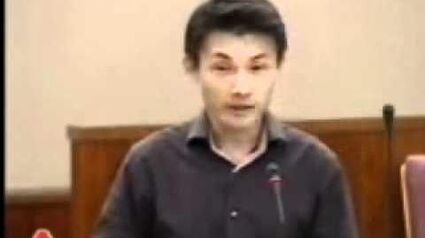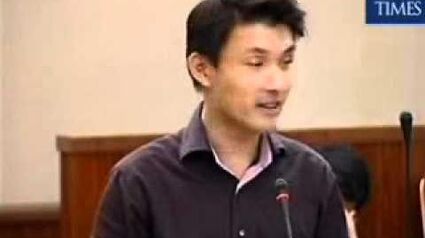Parliamentary debate on Section 377A
During the parliamentary debate on 22 and 23 October 2007 over the petition to repeal Section 377A of the Penal Code which criminalises sex between men, Baey spoke up in favour of it.
Transcript:
The section that has attracted the most number of opinions, most heated public debate, with two online petitions and one Public Petition to Parliament is, in fact, one that has been retained - section 377A which probably has become the most known piece of legislation in recent Singapore history.
Let us look at this issue in a hypothetical scenario. Singapore was never a British colony and we did not inherit section 377A. Today's debate then becomes one of justifying the introduction of a new piece of legislation which states that, "It is an offence for any male person, who in public or private, commits an act of gross indecency with another male person.".
The rationale will be that since Singapore is a generally conservative society, we should single out and criminalise all sexual activities between two men while accepting that the same activity of anal and oral sex between a heterosexual couple and sexual activity between two women need not be offences.
By doing so, we will be aligning our law with most countries in Africa and Middle East. In this hypothetical scenario, perhaps some countries like India, Sri Lanka, Pakistan and Malaysia will also introduce similar Acts, as what their current position is. Other former British colonies which have since repealed the 19th century law, such as Australia, New Zealand and Hong Kong, will most likely not think it is necessary to now criminalise man-to-man sex.
While almost all western countries do not have similar laws, we will argue that it is not relevant for us to take reference from them. However, we are also choosing not to benchmark Singapore against countries like China, Indonesia, Thailand, Japan, South Korea and the Philippines which do not have laws that criminalise male homosexual ctivity.
According to various points raised by the public, by not criminalising gay sex, it will lead to an increase in homosexual activity, both in public and private. There will also be more male paedophiles eyeing young boys, blatant public solicitation and more AIDS patients.
The fact that in 2006, of all the new AIDS cases in Singapore, homosexual transmission constitutes only 26% does not seem to register clearly with the public.
We also know that there are already laws and there will be stronger laws against prostitution, sexual abuse, exploitation of minors and public indecency. Maybe that is why we will propose that section 377A need not and will not be proactively enforced.
Can the Senior Minister of State give examples of situations where specific enforcement of only section 377A may be needed? Yesterday, he mentioned previous convictions under section 377A, but it seems to me that they could also have been prosecuted under other sections. With no proactive enforcement, should anyone be a good citizen and report private gay sexual activities to the police or will they be simply ignored? Will
there be ramifications of this legislation? If someone rents his apartment to a gay couple, will he be charged as an abetting accomplice to a crime under section V of the Penal Code? Besides valid immigration and employment papers, should landlords now ask for confirmation of their tenant's sexual orientation?
With a punishment by up to two years of imprisonment, we are deeming that such activities are of similar severity as causing death by negligent act in section 304A(b), and wrongfully confining any person for three or more days in section 345, and assault or use of criminal force to a person with intent to outrage modesty in section 354(1).
Our justification will also be supported by various surveys, including a NTU study published in September 2007 which saw that 68.6% of respondents in Singapore were negative towards sex between two men or two women. However, it is also interesting to note that some countries choose not to reflect such social non-acceptance in legislation.
Based on the Pew Global Attitudes Project in 2003, 93% in Indonesia and 84% in Vietnam say that homosexuality should not be accepted by society, but these countries have no equivalent of section 377A.
I assume most Singaporeans do not have many gay acquaintances. We are likely to gather our knowledge and form our opinions of the homosexual world from media reports. I believe certain stereotypes of homosexuals in people's minds will include effeminate men, like Boy George, men who prey on young boys, eg, Christopher Neil, flamboyant men who seem to lead decadent lifestyles, like Elton John, and AIDS patients, like Paddy Chew.
I do know quite a number of homosexual men and women. However, the majority, if not all of them, do not fall into any of those abovementioned stereotype categories. Well, they include some very talented and creative people - a common impression of gays which many have said is totally unfounded. These are the directors, actors, hairstylists
and designers. But I also know many gay men who are just your average men on the street, making a living as lawyers, lecturers, engineers, accountants, bankers, teachers and civil servants.
I know they have different sexual practices from me, and I have treated them just as any other person. Now, I am reminded that perhaps I should see them as criminals who should spend time behind bars. Perhaps, the thousands of audience who paid as much as $400 to watch Sir Ian McKellen, better known as Gandalf in Lord of the Rings, playing King Lear, in July, might think twice now as he is an openly gay man and hence should object to allowing a criminal on the stage of our Esplanade.
There are negative and positive steps a country can do to discourage and encourage certain behaviours. For example, we do not want to condone smoking and drinking. These acts are not criminal under the law, although we have made tobacco and alcohol less accessible and a lot more expensive. We want to promote marriage and procreation. Hence, singles do not enjoy certain tax and housing benefits, but they are not jailed.
We may be utterly surprised, disappointed, embarrassed, disgusted and angry with our friends, our colleagues and our relatives if we find out they are gay. I will be saddened if my son is gay, because I realise I will not have any grandchildren by him. I may choose to disown him, but now we are saying that he should be jailed.
In Chinese
Sir, I will now continue my speech in Mandarin.
(In Mandarin): [For vernacular speech, please refer to Appendix A *. ] As the Chinese saying goes, 不孝有三,無後為大 (Bu Xiao You San, Wu Hou Wei Da) which means, "There are three unfilial acts, the greatest is not to have a son." This is an important concept in a traditional and oriental society like ours. Parents are hoping that their sons will have wives and their daughters will be married, and the children also understand that it is an obligation for them to get married and have children. Nevertheless many people choose to marry late, not to get married, or not to have children, and for some it remains solely a personal choice. There are many reasons, but one reason is that they are homosexuals.
I have some homosexual friends and most of them do not want to make public the fact about their sexual inclination, because Singapore is after all a more conservative society. They will only confide with their close friends, colleagues and siblings. More often than not, parents are the last to know. Especially for those who are male homosexuals, the gays, they will not be able to have children and they do not know how to live up to their parents' expectations. A friend of mine did not have the courage to tell his parents. And only after his father had passed away that he disclosed his secret at his father's coffin. Even now the mother does not know about it.
When parents find out that their children do not like the opposite sex, their immediate reaction is that of shock, sadness, shame, anger or remorse, and they try to find out what has gone wrong - why their children had become homosexuals. Some of the parents chose to run away from reality and one of my friend's mother had gone to the temple to pray, she came back with a charm mixed with water, with the hope that after drinking it, it will cure the son. They do not know what to do and some of them even chase their son out of the house, but if they were to take time to think it through calmly, I do not believe that they will charge their son in court and send him to prison for two years.
I have a friend who is the only child in the family. His mother still could not fully accept the fact that her son does not have any interest in the opposite sex. She was more worried that her son may be sentenced to jail being a homosexual. However, she is the person that knows him best, she knows that her son is very filial and obedient; he is a law-abiding citizen and a successful professional. Also, she has known the "boyfriend" of her son for many years and knows they do not have a promiscuous lifestyle.
As parents, we are often the best judges of our children's character. Having a different sexual orientation from the others does not mean that they have committed a heinous crime and therefore should be criminalised.
Back in English
Back to my hypothetical scenario, we will also say that we introduce section 377A as a symbol that the society is conservative and that we do not want to go down a slippery slope to see public display of affection between men, the fight for gay rights and gay marriages. For seven years, I have lived in London, a city that legalised consensual homosexual sex 40 years ago in 1967. I am hence surprised to recollect my time there and I have not ever seen any such behaviour or intimacy between two men in public whilst I was there. Perhaps Ihave not been to the right places, but I have not indeed seen anyone before my eyes.
Perhaps we are afraid that the slope will be more slippery in Singapore. After all, we have a track record of taking a more progressive stance in some areas, such as stem cell research and digital rights, leading the way, so to speak.
We take into account the change of times and lifestyles. For example, section 376E on sexual grooming of minors is farsighted nip in the bud. Times have changed and our attitudes towards different crimes and their punishments have evolved as well.
Should the law reflect the general or popular opinion or should it set up a framework to steer the way of thinking and behaviour of its citizens, residents and visitors?It is clear that we have chosen to take the former approach in this case.
I do recognise that in today's situation, there is already an existing Act, and the debate is whether it should be retained or repealed and not whether we should introduce a new Act. We have inherited section 377A from the British.
It is easier and, as the Senior Minister of State said, more practical to maintain the status quo than to change it. Because of the extensive and, some may say, polarised debate, we may not be ready to repeal the Act now.
However, whether the perceived majority holding the status quo view has enough knowledge and understanding of the subject matter to make an informed opinion, is another question. I suspect a significant segment of our society does not really care and some are just uncomfortable with this topic and choose the convenient way to stick with the status quo without knowing what the Act exactly is and does.
Last week, a resident came to my meet-the-people session and said that she is happy that the Government is retaining section377A. I asked her, "Do you know what section 377A is about?" She said, "I don't know."
I am happy to note that both the proposition and the opposition have spoken publicly and rationally. Hopefully, the Government will provide the environment to encourage the continuation of such dialogue so that the society at large can achieve a better understanding of the matter. I want to especially encourage voices from institutions, like the Law Society, so that this discussion will not be driven to periphery. Hopefully, the discussion will be ongoing and not just during the next review of the Penal Code. Hopefully, the review will happen earlier rather than another 23 years later. Hopefully, we will move with and not play catching up with the pace of change around the world that is affecting people's lives.
Sir, with that, I support the Bill.
NLB saga
On Friday, 19 July 2014, Baey posted the following message as a Facebook status update[1]:
"Thank you, Minister Yaacob for instructing NLB not to pulp ‘And Tango Makes Three’ and ‘The White Swan Express’, and to place them in the adult section of our libraries. Glad that you have also asked NLB to review the process by which they deal with such books.
Ultimately, parents must be the ones to decide what books their children read, and what values their children should have. The government can provide the access and choices, but the responsibility cannot be outsourced to the government."
See also
References
Acknowlegdements
This article was written by Roy Tan.


